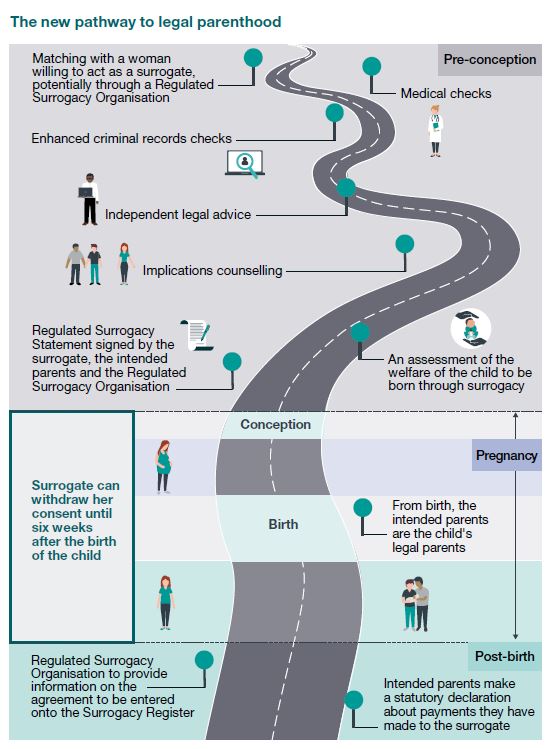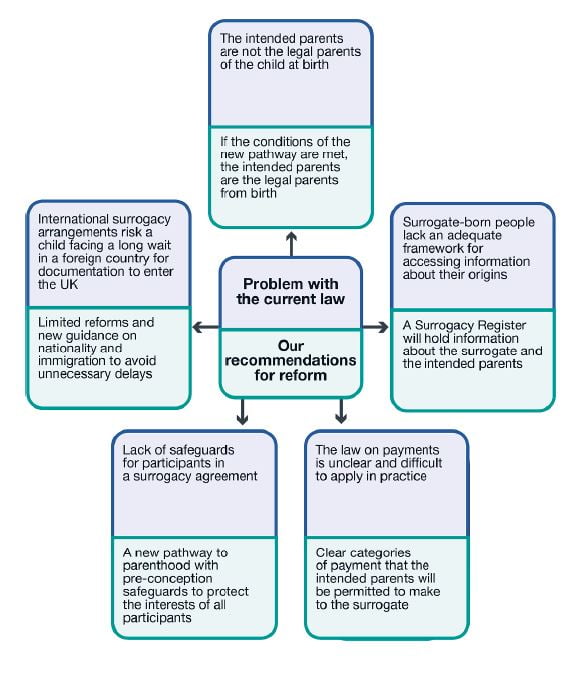At the beginning of the month, Hazel looked at current UK surrogacy laws, and whether they are going to change for the better the long-awaited Law Commission’s final proposals for reform of the law relating to surrogacy in the UK.
The report recommends the following key reforms:
A new pathway:
The creation of a new pathway to legal parenthood for domestic surrogacy arrangements, which will allow intended parents to be legal parents from birth. The intended parent(s) currently must wait at least 6 weeks to become the legal parents, but this in practice can be up to a year due to court delays.

Requirements and safeguards for the new pathway:
To ensure that surrogacy is the right decision for the surrogate and intended parents, and that the welfare of the child born is protected. The current law lacks safeguards for all those involved in a surrogacy agreement.
New rules on payments:
Reforms to the law governing the payments that intended parents can make to the surrogate, to provide clarity, transparency and an effective means of enforcing limitations, and to guard against the risks of exploitation. Prohibited payments include those made for carrying the child, compensatory payments and living expenses.
Overseen by non-profit surrogacy organisations:
The Regulated Surrogacy Organisations, who will be non-profit-making bodies regulated by the Human Fertilisation and Embryology Authority (HFEA) will oversee agreements under the new pathway, providing important support to the surrogate and the intended parents.
Reforms to the parental order process:
This will include provision for the court to make a parental order even if the surrogate should decide to withdraw her consent up to six weeks after the birth of the child, provided the welfare of the child requires that an order be made.
A new Surrogacy Register:
The creation of a new Surrogacy Register to allow those born of surrogacy agreements to access information in order to trace their origins when they are older.
Employment rights:
The recommendations will ensure a surrogate is treated in the same way as any woman who is pregnant, and the intended parents are treated in the same way as any other person with a new child in terms of their employment rights.
International Surrogacy Agreements:
Some limited reforms and the provision of comprehensive guidance on nationality and immigration issues, to loosen the barriers and unnecessary delay for those who have had a child through surrogacy overseas bringing the child to the UK, such as permitting intended parent(s) to commence the application process for a child’s passport and visas before birth, although the formal application can only be submitted once the child is born.
What are the consequences of these recommendations?
Intended parents will be in a much stronger position if recommendations to the law are followed through. The report also focuses on encouraging UK surrogacy rather than international arrangements, where exploitation risks can be considerably higher than in domestic arrangements. Although some campaigners feel the recommendations do not go far enough to address the current issues, in particular the lack of significant changes on international surrogacy, this is a positive step forwards in updating almost 40-year-old legislation that clearly did not meet the best interests of those involved. It is now for the draft legislation to be reviewed by the government and to decide whether the Draft Bill should become law. Watch this space.

How can Hanne & Co’s family team help you?
Given the complexities and potential risks surrounding the surrogacy process and the procedure for applying for a parental order, it is crucial to obtain legal advice at an early stage to avoid issues arising later on. We recognise how stressful the process can be and are on hand to provide high quality advice specific to your circumstances.
